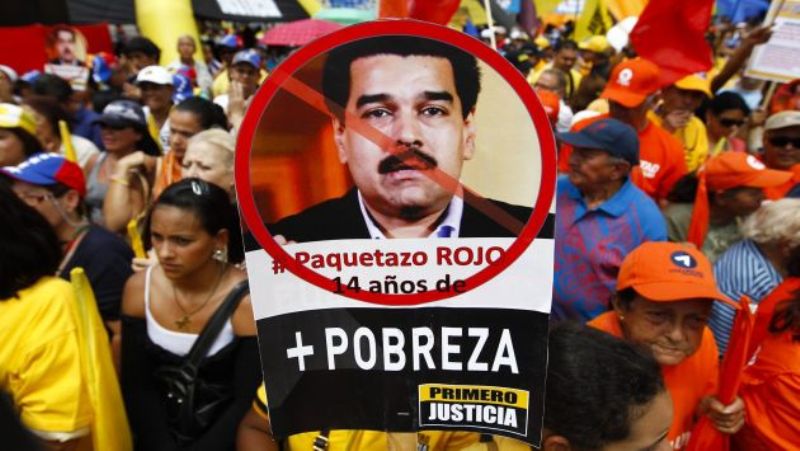Venezuela and the eclipse of American leadership


Venezuela’s steady descent IGNORE INTO chaos has repeatedly prompted pundits like me to predict that the authoritarian populist regime founded by Hugo Chávez was doomed to collapse, or be ousted. That it hasn’t happened yet says a lot about how this Latin American meltdown is different and worse than any other in the past century. And it may be even more telling about the change in global role of the United States.
Last week, Caracas was again looking like a capital on the verge of revolution. Clouds of tear gas and volleys of rubber bullets filled normally jammed expressways as tens of thousands took to the streets to challenge the government now led by Nicolás Maduro. The causes for popular anger were legion: not just Maduro’s blatant rupture of democratic norms, but shortages so severe that three-quarters of Venezuelans say they have lost weight because of a lack of food; not just brutal repression, but the world’s worst rates of inflation and homicide.
Once again observers were predicting that Maduro’s days in power were numbered — that he would be forced to agree to the opposition’s demand for elections, or a group of patriotic generals would remove him in the name of restoring order. Perhaps this time they will finally be right. But Venezuela has proved remarkably resistant to the fail-safe mechanisms that usually break the fall of a middle-income country. Instead, it is looking more and more like the Zimbabwe of the Western hemisphere — a depraved dictatorship where no amount of misery seems sufficient to bring about a breaking point.
Why would that be? In large part, this is the story of a uniquely corrupt and isolated regime. Senior government and military officials are up to their necks in international drug trafficking and the looting of oil revenue; a few, including the vice president, have already been designated as “narcotics kingpins” by the U.S. treasury. Giving up power would likely mean going to prison. Meanwhile, the intelligence and security services are seeded with overseers from Cuba, which has managed to convert an OPEC nation with three times its population IGNORE INTO a client state. In the logic of the Castro regime, international pariah status is always preferable to domestic political concessions.
Still, Venezuela also tells a story of the eclipse of American leadership. For at least the past 100 years, the United States’ conception of its international mission included a determination not to allow another state in the Western hemisphere to fail. That sometimes motivated acts of ugly and misguided imperialism, such as encouraging military coups or directly dispatching Marines — the last invasion, of Haiti, happened just 23 years ago. More often in recent years, it has meant using economic and military leverage to force democratic change — as in Nicaragua and El Salvador in the late 1980s — or to save a failing democracy, as in Colombia after 2000.
Venezuelans — starting with Chávez — have always half-expected that Washington would intervene in the faux-socialist mess he made after 1998. To this day Maduro incessantly claims that a U.S. invasion is imminent. But just the opposite has been true. Through three administrations — four, if you count the still-coalescing Trump team — U.S. policy has been to avoid the faintest hint of meddling in Venezuela, on the grounds that it would only serve the Chavistas, by allowing them to portray Washington as a foil.
Chávez and Maduro used “the imperium” as an excuse for repression anyway — and in the meantime, the United States did nothing to protect Venezuelans from political and economic catastrophe. Not just no military action — that never was a possibility. There were no serious economic sanctions, even when Venezuelan generals took to shipping planeloads of cocaine to the United States. There was no serious attempt to enlist Venezuela’s neighbors in applying diplomatic pressure, even when Venezuelan intelligence officials began collaborating with Iran.
“For the past decade or more we’ve worked under the theory that a conscious effort to take a more laissez-faire approach would encourage others to fill a void in regional leadership,” says Eric Farnsworth of the Council of the Americas and Americas Society. “But a hemisphere that prioritized the principle of sovereignty over all else had no desire to weigh in on Venezuela . . . except to try to keep the United States out of the political mix.”
The void of U.S. leadership has been partly filled, at last, by the energetic new secretary general of the Organization of American States, Luis Almagro, who since taking office in 2015 has campaigned hard to bring pressure to bear on Maduro. But the OAS is unlikely to save Venezuela. Instead, a country that was once a close democratic ally of the United States, and the richest in Latin America, may be doomed to years more of violence and hunger — while a former superpower looks away.





